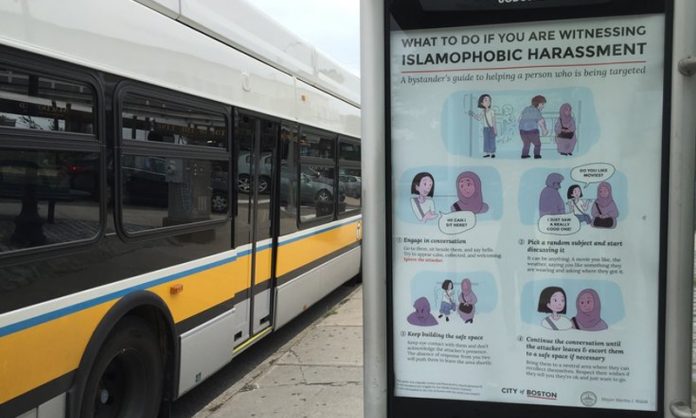Signs are everywhere these days urging Americans “If you see something, say something.” Now, in Boston, new posters are going up that urge residents to go a step further and intervene if they see Islamophobic harassment. From a distance, it looks like a cute cartoon, until you read the bold black headline – “What to do if you are witnessing Islamophobic harassment.” Below is a giant comic strip showing a young woman watching as a burly guy grimaces at a woman in a long dress and hijab.
“It is a sign of really frightening times,” says 59-year-old Diane Shufro, who did a double take as she passed one of the posters on the side of a bus stop in Boston. But she says she’s heartened to see city officials encouraging people to be involved. “I hope it gets people thinking,” she says.
Step one, the poster implores: “Ignore the attacker.” In other words, don’t even make eye contact. Instead, the poster instructs, start talking to the person being attacked — about anything.
“You can say something about you like the shoes that someone is wearing or you know, asking them about the weather or things like that,” says Faisa Sharif, a mayor’s liaison in Boston’s Neighborhood Services Office within the Civic Engagement Cabinet. The goal, she says, is to break the tension, and to show residents that even the simple friendly gesture of striking up a casual conversation with a person who is being harassed, will often get an aggressor to back off.
“This whole campaign is about de-escalation in terms of helping resolve a situation like this,” says Sharif. “Especially in the age that we live in when we see a different sort of national rhetoric targeted toward certain groups.”
Sharif says the posters were designed in France after the terror attacks in 2015, and then went up in San Francisco. A Boston resident suggested the posters be brought here. On a recent afternoon in Boston, the message was already getting through to passersby.





